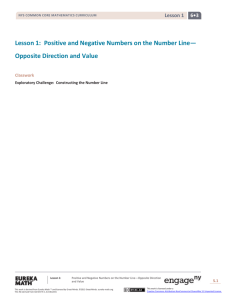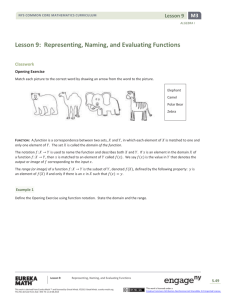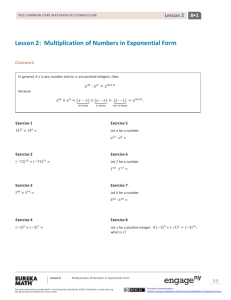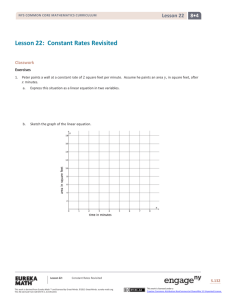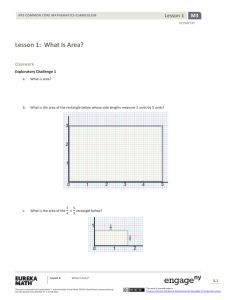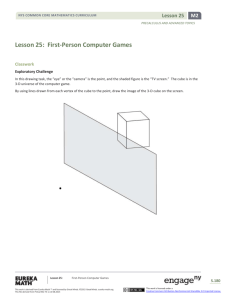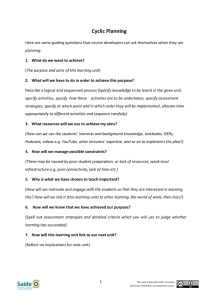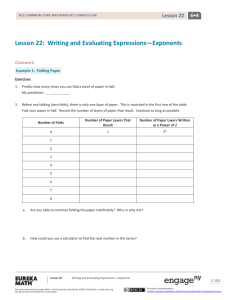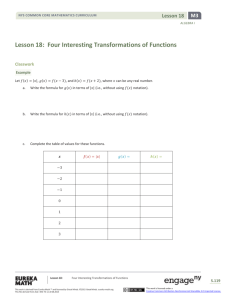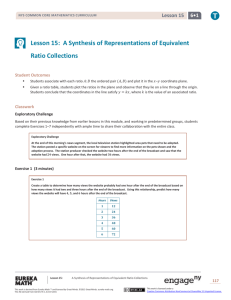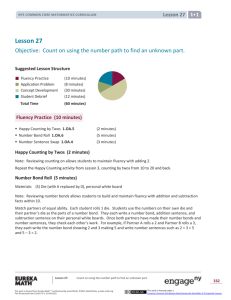Lesson 31: Problems in Mathematical Terms
advertisement
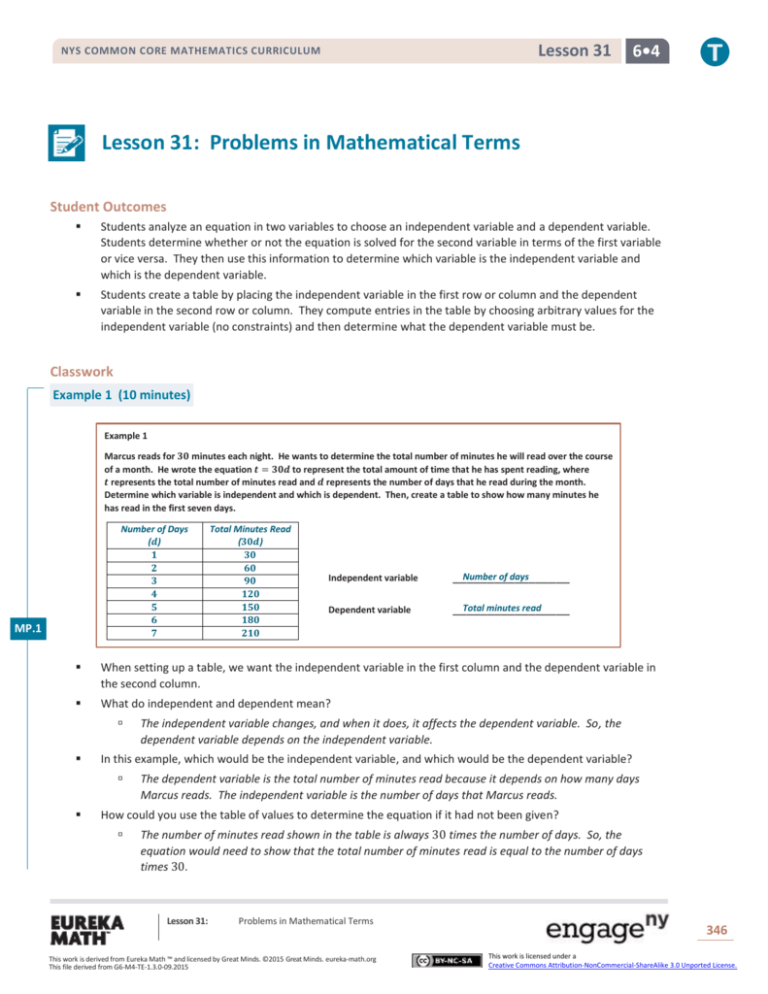
Lesson 31 NYS COMMON CORE MATHEMATICS CURRICULUM 6•4 Lesson 31: Problems in Mathematical Terms Student Outcomes Students analyze an equation in two variables to choose an independent variable and a dependent variable. Students determine whether or not the equation is solved for the second variable in terms of the first variable or vice versa. They then use this information to determine which variable is the independent variable and which is the dependent variable. Students create a table by placing the independent variable in the first row or column and the dependent variable in the second row or column. They compute entries in the table by choosing arbitrary values for the independent variable (no constraints) and then determine what the dependent variable must be. Classwork Example 1 (10 minutes) Example 1 Marcus reads for 𝟑𝟎 minutes each night. He wants to determine the total number of minutes he will read over the course of a month. He wrote the equation 𝒕 = 𝟑𝟎𝒅 to represent the total amount of time that he has spent reading, where 𝒕 represents the total number of minutes read and 𝒅 represents the number of days that he read during the month. Determine which variable is independent and which is dependent. Then, create a table to show how many minutes he has read in the first seven days. Number of Days (𝒅) 𝟏 𝟐 𝟑 𝟒 𝟓 𝟔 𝟕 MP.1 Total Minutes Read (𝟑𝟎𝒅) 𝟑𝟎 𝟔𝟎 𝟗𝟎 𝟏𝟐𝟎 𝟏𝟓𝟎 𝟏𝟖𝟎 𝟐𝟏𝟎 Independent variable Number of days _________________ Dependent variable Total minutes read _________________ When setting up a table, we want the independent variable in the first column and the dependent variable in the second column. What do independent and dependent mean? In this example, which would be the independent variable, and which would be the dependent variable? The independent variable changes, and when it does, it affects the dependent variable. So, the dependent variable depends on the independent variable. The dependent variable is the total number of minutes read because it depends on how many days Marcus reads. The independent variable is the number of days that Marcus reads. How could you use the table of values to determine the equation if it had not been given? The number of minutes read shown in the table is always 30 times the number of days. So, the equation would need to show that the total number of minutes read is equal to the number of days times 30. Lesson 31: Problems in Mathematical Terms This work is derived from Eureka Math ™ and licensed by Great Minds. ©2015 Great Minds. eureka-math.org This file derived from G6-M4-TE-1.3.0-09.2015 346 This work is licensed under a Creative Commons Attribution-NonCommercial-ShareAlike 3.0 Unported License. Lesson 31 NYS COMMON CORE MATHEMATICS CURRICULUM 6•4 Example 2 (5 minutes) Example 2 Kira designs websites. She can create three different websites each week. Kira wants to create an equation that will give her the total number of websites she can design given the number of weeks she works. Determine the independent and dependent variables. Create a table to show the number of websites she can design over the first 𝟓 weeks. Finally, write an equation to represent the number of websites she can design when given any number of weeks. # of weeks worked Independent variable_____________________ # of websites designed Dependent variable______________________ # of Weeks Worked (𝒘) 𝟏 𝟐 𝟑 𝟒 𝟓 # of Websites Designed (𝒅) 𝟑 𝟔 𝟗 𝟏𝟐 𝟏𝟓 𝒅 = 𝟑𝒘, where 𝒘 is the number of weeks worked and 𝒅 is the number of websites designed. Equation____________________________________________________________ How did you determine which is the dependent variable and which is the independent variable? Because the number of websites she can make depends on how many weeks she works, I determined that the number of weeks worked was the independent variable, and the number of websites designed was the dependent variable. Does knowing which one is independent and which one is dependent help you write the equation? MP.1 I can write the equation and solve for the dependent variable by knowing how the independent variable will affect the dependent variable. In this case, I knew that every week 3 more websites could be completed, so then I multiplied the number of weeks by 3. Example 3 (5 minutes) Example 3 Priya streams movies through a company that charges her a $𝟓 monthly fee plus $𝟏. 𝟓𝟎 per movie. Determine the independent and dependent variables, write an equation to model the situation, and create a table to show the total cost per month given that she might stream between 𝟒 and 𝟏𝟎 movies in a month. # of Movies (𝒎) # of movies watched per month Independent variable______________________ Total cost per month, in dollars Dependent variable_______________________ 𝒄 = 𝟏. 𝟓𝒎 + 𝟓 or 𝒄 = 𝟏. 𝟓𝟎𝒎 + 𝟓 Equation______________________________ 𝟒 𝟓 𝟔 𝟕 𝟖 𝟗 𝟏𝟎 Total Cost Per Month, in dollars (𝒄) 𝟏𝟏 𝟏𝟐. 𝟓𝟎 𝟏𝟒 𝟏𝟓. 𝟓𝟎 𝟏𝟕 𝟏𝟖. 𝟓𝟎 𝟐𝟎 Is the flat fee an independent variable, a dependent variable, or neither? The $5 flat fee is neither. It is not causing the change in the dependent value, and it is not changing. Instead, the $5 flat fee is a constant that is added on each month. Lesson 31: Problems in Mathematical Terms This work is derived from Eureka Math ™ and licensed by Great Minds. ©2015 Great Minds. eureka-math.org This file derived from G6-M4-TE-1.3.0-09.2015 347 This work is licensed under a Creative Commons Attribution-NonCommercial-ShareAlike 3.0 Unported License. Lesson 31 NYS COMMON CORE MATHEMATICS CURRICULUM 6•4 Why isn’t the equation 𝑐 = 5𝑚 + 1.50? MP.1 The $5 fee is only paid once a month. 𝑚 is the number of movies watched per month, so it needs to be multiplied by the price per movie, which is $1.50. Exercises (15 minutes) Students work in pairs or independently. Exercises 1. Sarah is purchasing pencils to share. Each package has 𝟏𝟐 pencils. The equation 𝒏 = 𝟏𝟐𝒑, where 𝒏 is the total number of pencils and 𝒑 is the number of packages, can be used to determine the total number of pencils Sarah purchased. Determine which variable is dependent and which is independent. Then, make a table showing the number of pencils purchased for 𝟑–𝟕 packages. The number of packages, 𝒑, is the independent variable. The total number of pencils, 𝒏, is the dependent variable. # of Packages (𝒑) 𝟑 𝟒 𝟓 𝟔 𝟕 2. Total # of Pencils (𝒏 = 𝟏𝟐𝒑) 𝟑𝟔 𝟒𝟖 𝟔𝟎 𝟕𝟐 𝟖𝟒 Charlotte reads 𝟒 books each week. Let 𝒃 be the number of books she reads each week, and let 𝒘 be the number of weeks that she reads. Determine which variable is dependent and which is independent. Then, write an equation to model the situation, and make a table that shows the number of books read in under 𝟔 weeks. The number of weeks, 𝒘, is the independent variable. The number of books, 𝒃, is the dependent variable. 𝒃 = 𝟒𝒘 # of Weeks (𝒘) 𝟏 𝟐 𝟑 𝟒 𝟓 Lesson 31: Problems in Mathematical Terms This work is derived from Eureka Math ™ and licensed by Great Minds. ©2015 Great Minds. eureka-math.org This file derived from G6-M4-TE-1.3.0-09.2015 # of Books (𝒃 = 𝟒𝒘) 𝟒 𝟖 𝟏𝟐 𝟏𝟔 𝟐𝟎 348 This work is licensed under a Creative Commons Attribution-NonCommercial-ShareAlike 3.0 Unported License. Lesson 31 NYS COMMON CORE MATHEMATICS CURRICULUM 6•4 A miniature golf course has a special group rate. You can pay $𝟐𝟎 plus $𝟑 per person when you have a group of 𝟓 or more friends. Let 𝒇 be the number of friends and 𝒄 be the total cost. Determine which variable is independent and which is dependent, and write an equation that models the situation. Then, make a table to show the cost for 𝟓 to 𝟏𝟐 friends. 3. The number of friends, 𝒇, is the independent variable. The total cost in dollars, 𝒄, is the dependent variable. 𝒄 = 𝟑𝒇 + 𝟐𝟎 Total Cost, in dollars (𝒄 = 𝟑𝒇 + 𝟐𝟎) 𝟑𝟓 𝟑𝟖 𝟒𝟏 𝟒𝟒 𝟒𝟕 𝟓𝟎 𝟓𝟑 𝟓𝟔 # of Friends (𝒇) 𝟓 𝟔 𝟕 𝟖 𝟗 𝟏𝟎 𝟏𝟏 𝟏𝟐 Carlos is shopping for school supplies. He bought a pencil box for $𝟑, and he also needs to buy notebooks. Each notebook is $𝟐. Let 𝒕 represent the total cost of the supplies and 𝒏 be the number of notebooks Carlos buys. Determine which variable is independent and which is dependent, and write an equation that models the situation. Then, make a table to show the cost for 𝟏 to 𝟓 notebooks. 4. The total number of notebooks, 𝒏, is the independent variable. The total cost in dollars, 𝒕, is the dependent variable. 𝒕 = 𝟐𝒏 + 𝟑 # of Notebooks (𝒏) 𝟏 𝟐 𝟑 𝟒 𝟓 Total Cost, in dollars (𝒕 = 𝟐𝒏 + 𝟑) 𝟓 𝟕 𝟗 𝟏𝟏 𝟏𝟑 Closing (5 minutes) Use this time for partners to share their answers from the exercises with another set of partners. How can you determine which variable is independent and which variable is dependent? The dependent variable is affected by changes in the independent variable. I can write a sentence stating that one variable depends on another. For example, the amount of money earned depends on the number of hours worked. So, the money earned is the dependent variable, and the number of hours worked is the independent variable. Exit Ticket (5 minutes) Lesson 31: Problems in Mathematical Terms This work is derived from Eureka Math ™ and licensed by Great Minds. ©2015 Great Minds. eureka-math.org This file derived from G6-M4-TE-1.3.0-09.2015 349 This work is licensed under a Creative Commons Attribution-NonCommercial-ShareAlike 3.0 Unported License. Lesson 31 NYS COMMON CORE MATHEMATICS CURRICULUM Name 6•4 Date Lesson 31: Problems in Mathematical Terms Exit Ticket For each problem, determine the independent and dependent variables, write an equation to represent the situation, and then make a table with at least 5 values that models the situation. 1. Kyla spends 60 minutes of each day exercising. Let 𝑑 be the number of days that Kyla exercises, and let 𝑚 represent the total minutes of exercise in a given time frame. Show the relationship between the number of days that Kyla exercises and the total minutes that she exercises. Independent variable Dependent variable Equation 2. A taxicab service charges a flat fee of $8 plus an additional $1.50 per mile. Show the relationship between the total cost and the number of miles driven. Independent variable Dependent variable Equation Lesson 31: Problems in Mathematical Terms This work is derived from Eureka Math ™ and licensed by Great Minds. ©2015 Great Minds. eureka-math.org This file derived from G6-M4-TE-1.3.0-09.2015 350 This work is licensed under a Creative Commons Attribution-NonCommercial-ShareAlike 3.0 Unported License. Lesson 31 NYS COMMON CORE MATHEMATICS CURRICULUM 6•4 Exit Ticket Sample Solutions For each problem, determine the independent and dependent variables, write an equation to represent the situation, and then make a table with at least 𝟓 values that models the situation. 1. Kyla spends 𝟔𝟎 minutes of each day exercising. Let 𝒅 be the number of days that Kyla exercises, and let 𝒎 represent the total minutes of exercise in a given time frame. Show the relationship between the number of days that Kyla exercises and the total minutes that she exercises. Tables may vary. # of Days 𝟎 𝟏 𝟐 𝟑 𝟒 2. # of Minutes 𝟎 𝟔𝟎 𝟏𝟐𝟎 𝟏𝟖𝟎 𝟐𝟒𝟎 Independent variable Number of Days Dependent variable Total Number of Minutes Equation 𝒎 = 𝟔𝟎𝒅 A taxicab service charges a flat fee of $𝟖 plus an additional $𝟏. 𝟓𝟎 per mile. Show the relationship between the total cost and the number of miles driven. Tables may vary. # of Miles 𝟎 𝟏 𝟐 𝟑 𝟒 Independent variable Total Cost, in dollars 𝟖. 𝟎𝟎 𝟗. 𝟓𝟎 𝟏𝟏. 𝟎𝟎 𝟏𝟐. 𝟓𝟎 𝟏𝟒. 𝟎𝟎 Dependent variable Equation Number of miles Total cost, in dollars 𝒄 = 𝟏. 𝟓𝟎𝒎 + 𝟖 Problem Set Sample Solutions 1. Jaziyah sells 𝟑 houses each month. To determine the number of houses she can sell in any given number of months, she uses the equation 𝒕 = 𝟑𝒎, where 𝒕 is the total number of houses sold and 𝒎 is the number of months. Name the independent and dependent variables. Then, create a table to show how many houses she sells in fewer than 𝟔 months. The independent variable is the number of months. The dependent variable is the total number of houses sold. # of Months 𝟏 𝟐 𝟑 𝟒 𝟓 Lesson 31: Problems in Mathematical Terms This work is derived from Eureka Math ™ and licensed by Great Minds. ©2015 Great Minds. eureka-math.org This file derived from G6-M4-TE-1.3.0-09.2015 Total Number of Houses 𝟑 𝟔 𝟗 𝟏𝟐 𝟏𝟓 351 This work is licensed under a Creative Commons Attribution-NonCommercial-ShareAlike 3.0 Unported License. Lesson 31 NYS COMMON CORE MATHEMATICS CURRICULUM 2. 6•4 Joshua spends 𝟐𝟓 minutes of each day reading. Let 𝒅 be the number of days that he reads, and let 𝒎 represent the total minutes of reading. Determine which variable is independent and which is dependent. Then, write an equation that models the situation. Make a table showing the number of minutes spent reading over 𝟕 days. The number of days, 𝒅, is the independent variable. The total number of minutes of reading, 𝒎, is the dependent variable. 𝒎 = 𝟐𝟓𝒅 # of Days 𝟏 𝟐 𝟑 𝟒 𝟓 𝟔 𝟕 3. # of Minutes 𝟐𝟓 𝟓𝟎 𝟕𝟓 𝟏𝟎𝟎 𝟏𝟐𝟓 𝟏𝟓𝟎 𝟏𝟕𝟓 Each package of hot dog buns contains 𝟖 buns. Let 𝒑 be the number of packages of hot dog buns and 𝒃 be the total number of buns. Determine which variable is independent and which is dependent. Then, write an equation that models the situation, and make a table showing the number of hot dog buns in 𝟑 to 𝟖 packages. The number of packages, 𝒑, is the independent variable. The total number of hot dog buns, 𝒃, is the dependent variable. 𝒃 = 𝟖𝒑 # of Packages 𝟑 𝟒 𝟓 𝟔 𝟕 𝟖 4. Total # of Hot Dog Buns 𝟐𝟒 𝟑𝟐 𝟒𝟎 𝟒𝟖 𝟓𝟔 𝟔𝟒 Emma was given 𝟓 seashells. Each week she collected 𝟑 more. Let 𝒘 be the number of weeks Emma collects seashells and 𝒔 be the number of seashells she has total. Which variable is independent, and which is dependent? Write an equation to model the relationship, and make a table to show how many seashells she has from week 𝟒 to week 𝟏𝟎. The number of weeks, 𝒘, is the independent variable. The total number of seashells, 𝒔, is the dependent variable. 𝒔 = 𝟑𝒘 + 𝟓 # of Weeks 𝟒 𝟓 𝟔 𝟕 𝟖 𝟗 𝟏𝟎 Lesson 31: Total # of Seashells 𝟏𝟕 𝟐𝟎 𝟐𝟑 𝟐𝟔 𝟐𝟗 𝟑𝟐 𝟑𝟓 Problems in Mathematical Terms This work is derived from Eureka Math ™ and licensed by Great Minds. ©2015 Great Minds. eureka-math.org This file derived from G6-M4-TE-1.3.0-09.2015 352 This work is licensed under a Creative Commons Attribution-NonCommercial-ShareAlike 3.0 Unported License. Lesson 31 NYS COMMON CORE MATHEMATICS CURRICULUM 5. 6•4 Emilia is shopping for fresh produce at a farmers’ market. She bought a watermelon for $𝟓, and she also wants to buy peppers. Each pepper is $𝟎. 𝟕𝟓. Let 𝒕 represent the total cost of the produce and 𝒏 be the number of peppers bought. Determine which variable is independent and which is dependent, and write an equation that models the situation. Then, make a table to show the cost for 𝟏 to 𝟓 peppers. The number of peppers, 𝒏, is the independent variable. The total cost in dollars, 𝒕, is the dependent variable. 𝒕 = 𝟎. 𝟕𝟓𝒏 + 𝟓 # of Peppers 𝟏 𝟐 𝟑 𝟒 𝟓 6. Total Cost, in dollars 𝟓. 𝟕𝟓 𝟔. 𝟓𝟎 𝟕. 𝟐𝟓 𝟖. 𝟎𝟎 𝟖. 𝟕𝟓 A taxicab service charges a flat fee of $𝟕 plus an additional $𝟏. 𝟐𝟓 per mile driven. Show the relationship between the total cost and the number of miles driven. Which variable is independent, and which is dependent? Write an equation to model the relationship, and make a table to show the cost of 𝟒 to 𝟏𝟎 miles. The number of miles driven, 𝒎, is the independent variable. The total cost in dollars, 𝒄, is the dependent variable. 𝒄 = 𝟏. 𝟐𝟓𝒎 + 𝟕 # of Miles 𝟒 𝟓 𝟔 𝟕 𝟖 𝟗 𝟏𝟎 Lesson 31: Total Cost, in dollars 𝟏𝟐. 𝟎𝟎 𝟏𝟑. 𝟐𝟓 𝟏𝟒. 𝟓𝟎 𝟏𝟓. 𝟕𝟓 𝟏𝟕. 𝟎𝟎 𝟏𝟖. 𝟐𝟓 𝟏𝟗. 𝟓𝟎 Problems in Mathematical Terms This work is derived from Eureka Math ™ and licensed by Great Minds. ©2015 Great Minds. eureka-math.org This file derived from G6-M4-TE-1.3.0-09.2015 353 This work is licensed under a Creative Commons Attribution-NonCommercial-ShareAlike 3.0 Unported License.
